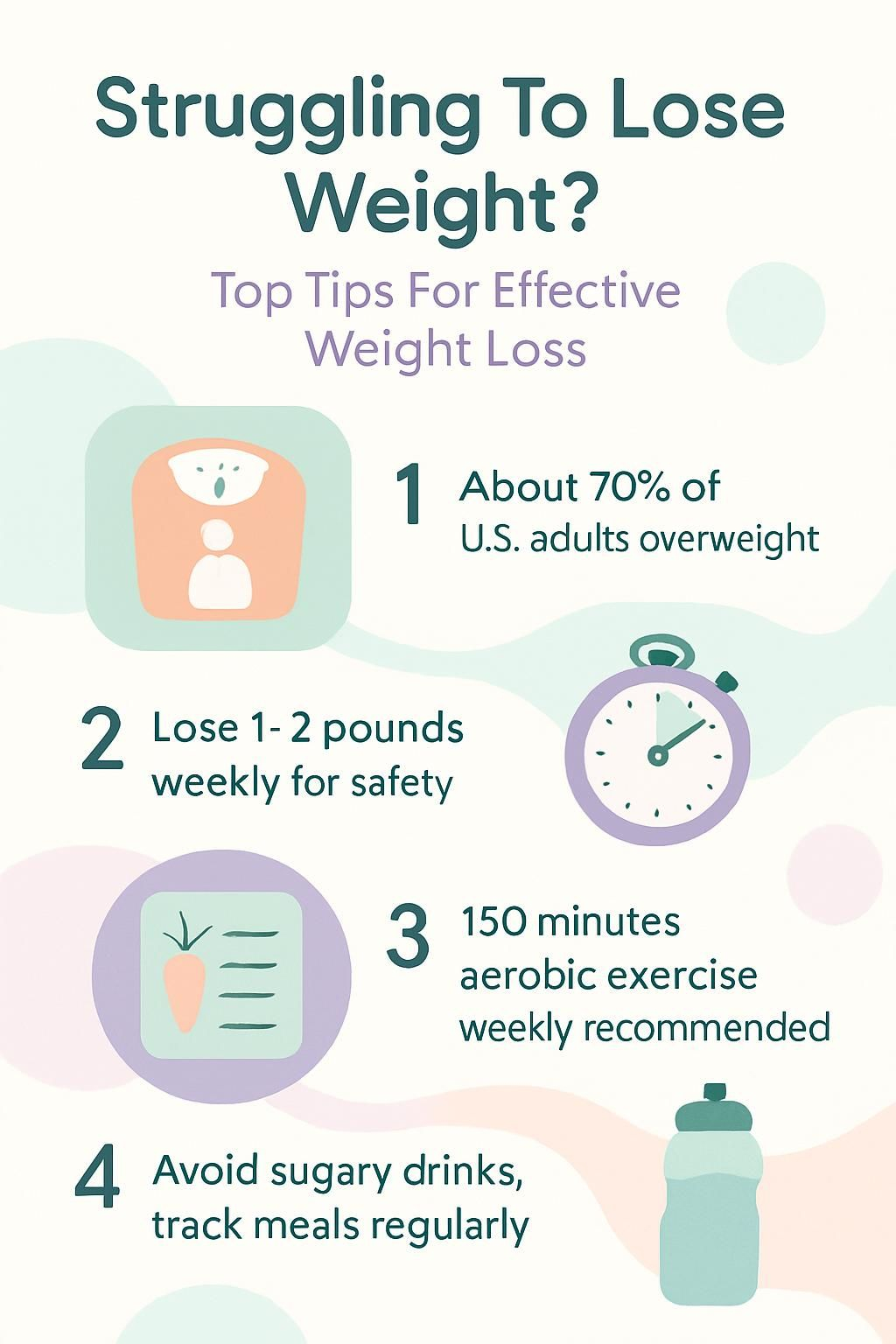Struggling To Lose Weight? Top Tips For Effective Weight Loss
Our Nutrition Assistant AI Suite will transform your body. You will lose fat, get toned, and build muscle. Gain confidence and optimal health.
Struggling to lose weight can feel confusing and exhausting, especially when the scale will not budge. In the United States, about 70 percent of adults live with overweight or obesity, according to the CDC. You are not alone on this weight loss journey.
This guide shares clear, proven steps to help you lose weight: smart eating, realistic goals, active living, and knowing when to get medical support. Use these tips to build habits you can keep for life. This content is educational and does not replace advice from your doctor.
Key Takeaways
- Roughly 70 percent of U.S. adults have overweight or obesity, making healthy weight management a major public health need (CDC, 2023).
- A safe pace is 1 to 2 pounds per week, with an early target of losing 5 percent of body weight.
- Insulin resistance, short sleep under seven hours, low activity, and hormonal issues like PCOS are common reasons progress stalls.
- Combining strength training with at least 150 minutes of weekly aerobic exercise raises calorie burn and helps break plateaus.
- Skip sugary drinks, track meals, celebrate small wins, and see a clinician when needed to support long-term results.

Biological, Lifestyle, and Psychological Challenges in Weight Loss

Losing weight is not just about willpower. Your biology, daily routines, and emotions all play a role. These forces can slow progress even when you eat well and move more.
How do biological factors affect weight loss?
As you age, metabolism slows, which means your body burns fewer calories at rest. Hypothyroidism, a low thyroid condition, slows metabolism even more and can raise weight.
Genes can nudge the body to store fat more easily. Hormonal problems such as polycystic ovary syndrome, called PCOS, may increase appetite and fat storage. Insulin resistance, where cells handle sugar poorly, pushes extra sugar into fat tissue instead of using it for energy.
Some medicines, including corticosteroids and certain antidepressants, can spark weight gain by raising hunger or lowering calorie burn.
My doctor told me my thyroid was slowing me down. Once I got treatment, it became easier to control my appetite and start losing 1 to 2 pounds per week.
What lifestyle habits make losing weight difficult?
Sitting for long stretches lowers daily calorie burn. A steady diet of ultra-processed foods, sugary snacks, and soft drinks packs many calories into small portions and drives hunger later.
Short sleep raises ghrelin, the hunger hormone, and lowers leptin, the fullness hormone. Stress can lead to comfort eating and cravings for high-calorie foods. Even mild dehydration can feel like hunger and lead to snacking.
Small choices add up. Choosing the couch over a walk, or fast food over a quick home meal, can slow progress day after day.
How do psychological barriers impact weight loss?
Stress, boredom, and tough emotions often trigger eating that is not driven by hunger. Higher cortisol, a stress hormone, pushes the body to store fat and can increase cravings.
Frustration is common when progress slows. Practicing self-compassion, tracking changes, and building a support network keeps momentum strong while you build new routines.
Brief check-ins with yourself, even five minutes a day, can help you spot patterns and plan a better response next time.
Common Causes of Weight Loss Struggles
Understanding what gets in the way helps you choose the right fix. The reasons below are common, and most can be improved with steady changes.
How does insulin resistance prevent weight loss?
With insulin resistance, cells do not respond well to insulin. Sugar builds up in the blood, then more of it gets stored as fat rather than burned for energy.
This cycle can cause hunger and tiredness between meals. Exercise improves how muscles use sugar. Some people also benefit from diabetes medicines, such as metformin or semaglutide, under a doctor’s care.
Regular aerobic activity and strength training raise insulin sensitivity, lower the risk of type 2 diabetes, and support healthy weight loss.
What is emotional eating and how does stress influence it?
Emotional eating means eating to soothe feelings instead of true hunger. Stress raises cortisol, which can boost appetite and drive cravings for sugar and fat.
People under chronic stress tend to eat larger portions and snack more often. That pattern can block weight loss and raise the risk of heart disease and prediabetes.
Stress skills help. Brief walks, breathing exercises, or a quick talk with a counselor can cut the urge to snack and protect your plan.
Why should I avoid sugary and artificially sweetened drinks?
Sweet drinks add calories fast and rarely make you full. Even zero-calorie drinks with artificial sweeteners may raise ghrelin, the hunger hormone, and trigger cravings.
Diet soda or energy drinks can lead to more snacking later. Some fizzy drinks, including sparkling water, may also nudge hunger for certain people.
Try water with berries, mint, or lemon. The American Heart Association notes that sweetened beverages can add many calories with little nutrition.
How does poor sleep quality affect weight loss?
Poor sleep disrupts hormones that control hunger and fullness. With less than seven hours, many people crave high-calorie foods and have less energy to cook or exercise.
Irregular sleep boosts cortisol, which slows metabolism and promotes fat storage. Aim for a steady schedule with 7 to 8 hours each night. If sleep stays hard, talk with your doctor about simple fixes.
What role do hormonal imbalances like PCOS play in weight gain?
PCOS affects many women and often comes with higher insulin and androgen levels. High insulin promotes fat storage, especially around the belly. Many with PCOS also have insulin resistance, which makes weight loss harder.
Standard diets may not deliver results here. Medicines such as metformin or GLP-1 drugs can help regulate hormones alongside nutrition and exercise. A clinician who understands PCOS can tailor a plan to your needs.
How does a sedentary lifestyle hinder weight loss?
Long periods of sitting reduce daily calorie burn. National guidelines suggest at least 150 minutes of moderate activity per week for health and weight control.
Short, frequent movement boosts results. Add steps, take the stairs, or stand during calls. Strength training grows muscle, which raises metabolism and helps push past a plateau.
Understanding Weight Loss Plateaus
Progress can stall even with a solid plan. Think of a plateau as feedback, not failure, and use it to adjust your approach.
What is a weight-loss plateau?
A plateau is a stretch when weight stops dropping despite consistent habits. As body mass decreases, your body needs fewer calories. The same calorie target that worked early on may stop working later.
This is normal. Metabolism adapts as you lose fat. If you never update your calorie target or your routine, your results can stall.
What causes weight-loss plateaus?
Repeating the same workouts allows your body to adapt and burn fewer calories. Doing only cardio or never changing intensity can slow progress.
Food patterns can also become too predictable. Slightly increasing protein, tightening portions, or adding higher intensity work, such as intervals, often restarts progress.
Effective Weight Loss Strategies
Practical strategies work best when they lower calories, protect muscle, and fit your life. Small steps compound over time.
How do I set realistic and achievable weight loss goals?
- Target 1 to 2 pounds per week. This rate is safe for most adults.
- Start with a 5 percent loss. At 180 pounds, that is about 9 pounds.
- Set action goals, such as walking 30 minutes daily or replacing soda and alcoholic drinks with water or unsweetened tea.
- Track food, exercise, hunger signals, and weight in a journal or app.
- Value consistency over perfection. Small wins build strong habits.
- Separate actions from outcomes. Focus on the steps you can control.
- If health issues, PCOS, or a medicine like Ozempic seems ineffective, consult your doctor before changing your plan.
- Celebrate non-scale victories, like looser clothes or fewer cravings, and skip fad diets.
- Review progress every two weeks. Adjust portions, stress skills, or activity as needed.
- Short milestones keep motivation high, especially if weight loss starts slowly.
How can I create a calorie deficit with balanced nutrition?
- Eat at least four servings of vegetables and three servings of fruit daily. Fiber adds fullness for fewer calories.
- Swap processed snacks for whole grains and nuts for steady energy and better nutrition.
- Limit sugary or diet drinks. Choose water, seltzer, or unsweetened tea.
- Use healthy fats like olive oil or avocado, but measure portions since oils are calorie dense.
- Build meals around protein, such as eggs, chicken breast, tofu, fish, or Greek yogurt, to protect muscle.
- Cut back on desserts and added sugars that drive calories without nutrients.
- Watch portions with smaller plates and by reading serving sizes.
- Log food to spot patterns. Self-monitoring supports lasting results.
- Limit alcohol. Drinks add calories and can weaken food choices later.
- Plan meals and snacks ahead so you are not stuck with only high-calorie options.
A calorie deficit should never mean starvation. Aim for steady, balanced changes that you can maintain.
Why should I focus on whole, unprocessed foods?
Whole foods usually contain fewer calories, more fiber, and better nutrients than processed choices. Swapping refined grains for whole grains helps control appetite and blood sugar.
Choosing low-fat or fat-free dairy can reduce saturated fat and sugar while keeping key nutrients. For breakfast, oatmeal or eggs beats a pastry for stable energy.
These swaps reduce cravings and make it easier to stick with your weight loss goals.
How do high-protein meals support weight loss?
Protein builds and maintains muscle. Muscle burns more calories than fat, even at rest, which supports a higher metabolism.
Research in the American Journal of Clinical Nutrition found that higher protein intake can increase fullness and reduce total calories. Pair produce with protein-rich snacks to steady blood sugar and reduce grazing.
Many people do well with about 0.7 to 1 gram of protein per kilogram of body weight, based on individual needs and medical guidance.
How important is hydration and avoiding sugary drinks?
Replacing sugary drinks with water can cut hundreds of calories per day. One can of soda often contains about 150 calories and more than 35 grams of sugar.
Better hydration may reduce cravings and support portion control. Add citrus, berries, or cucumber slices for flavor without extra sugar.
Studies link sweetened drinks to insulin resistance and weight gain. Reducing them helps many people see faster progress.
Exercise and Its Impact on Weight Loss
Movement is your daily assist. It burns calories now and reshapes metabolism over time.
What are the benefits of regular physical activity for weight loss?
Regular activity increases calorie burn, supports a calorie deficit, and improves mood. Brisk walking for 30 minutes most days is a strong start.
Exercise also lowers stress and can reduce emotional eating. Many people who include exercise in their plan are more likely to keep the weight off.
Activity helps blood pressure and sleep as well, both of which support long-term weight control.
Should I choose strength training or cardio to lose weight?
Use both. Cardio burns calories quickly. Strength training builds muscle, which raises your resting metabolism and helps maintain weight loss.
Two or more strength sessions weekly, plus regular cardio, tends to outperform either alone. This mix also helps you push through plateaus.
Pick activities you enjoy so the routine sticks. A clinician or certified trainer can help you build a safe, effective plan.
How does high-intensity interval training (HIIT) help with weight loss?
HIIT alternates short bursts of hard effort with rest. These workouts burn many calories in less time and can keep metabolism higher for hours after you finish.
Adding intervals or raising intensity breaks routine, improves insulin sensitivity, and supports fat loss, even on rest days. Short activity “snacks,” like two brisk 10-minute walks, can be easier to maintain than one long session.
Rotate HIIT with strength and steady cardio to protect recovery and avoid burnout.
Mindset Changes for Sustainable Weight Loss
Your mind steers your habits. Small mindset shifts create room for consistent action.
How can I overcome emotional eating?
- Check your readiness. List foods you crave during stress and how you feel before eating them.
- Spot triggers, such as work pressure, poor sleep, or conflict, that lead to snacking without hunger.
- Practice mindful eating. Slow down, focus on taste, and turn off screens.
- Swap comfort snacks for fruit, vegetables, or yogurt to lower sugar spikes.
- Keep a mood and hunger log. Patterns become clearer on paper.
- Seek help from a counselor or clinician for persistent stress, anxiety, or depression.
- Use relaxation skills, like deep breathing or a brief meditation, to reduce urges.
- Improve sleep habits. Short sleep raises hunger hormones and cravings.
- Limit alcohol since it lowers self-control around food.
- Reward progress with non-food treats, such as a new book or playlist.
What are the best ways to build consistency and patience?
- Set weekly targets that feel doable. Small wins build momentum.
- Track food and activity daily. Awareness leads to better choices.
- Plan meals so last-minute decisions do not derail your day.
- Exercise at a consistent time to cement the habit.
- Celebrate simple wins like skipping a sweetened beverage or cooking at home.
- Allow for missteps. Get back on track at the next meal.
- Sleep 7 to 9 hours nightly to protect mood and willpower.
- Find support from friends, online groups, or a program community.
- Review your routine monthly. Keep what works, change what does not.
Why is celebrating small victories important?
Small wins prove your plan is working. A quick note on the fridge or app checkmarks can keep motivation steady when the scale moves slowly.
Sharing progress with supportive people builds accountability and confidence. That energy makes the next good choice easier.
Overcoming Barriers to Weight Loss
Barriers lose power once you see them clearly. A short audit of your habits often reveals the next best step.
How can I reassess my habits and routines for better results?
- Use a food diary or app to find extra calories, especially from sugar and fat.
- Review past diets. Note patterns, like skipping breakfast or late-night eating.
- Replace sugary or diet sodas with water, seltzer, or unsweetened tea.
- Check portions with smaller plates and measured servings.
- Schedule at least 150 minutes of moderate exercise each week.
- Evaluate sleep. Adults getting under seven hours often struggle with weight control.
- Identify triggers such as stress or boredom. Try deep breathing before meals.
- Favor gradual changes. Choose whole grains, fruits, and vegetables over processed foods.
- Adjust one habit at a time to build consistency.
- Consult a clinician if PCOS, insulin resistance, or medications affect progress.
When should I seek professional help for medical conditions?
If steady effort does not lead to progress, a medical issue might be involved. See a primary care doctor to check for thyroid problems, insulin resistance, or hormonal imbalances such as PCOS.
A registered dietitian can tailor nutrition to your needs, especially if you have complex health concerns. Early care can remove roadblocks and restart weight loss.
Why should I avoid fad diets and focus on sustainability?
Fad diets often cut entire food groups or calories too sharply. That approach can increase cravings and fatigue, and most people regain the weight.
Sustainable plans rely on balanced nutrition, reasonable portions, and habits you can keep. Small, steady changes beat quick fixes every time.
Additional Methods to Enhance Weight Loss
Extra tools can help, as long as they fit your life and support consistency.
What is intermittent fasting and does it work?
Intermittent fasting alternates eating and fasting periods, such as 16 hours fasting with an 8-hour eating window. Studies suggest it can help create a calorie deficit and improve appetite control.
Results vary. Some people find it simple, while others feel overly hungry. Choose an approach you can sustain, and talk with your doctor if you have medical conditions or take medication.
How can stress management techniques improve weight loss?
High stress raises cortisol, which is linked to belly fat and overeating. Short practices like mindful breathing, a quick walk, or journaling can lower stress and cravings.
Pay attention to sleep as well. Poor rest raises both cortisol and hunger hormones, which can stall progress.
What are the best practices to improve sleep hygiene?
- Keep a regular sleep and wake time, even on weekends.
- Aim for 7 to 8 hours of sleep. Too little sleep increases appetite.
- Limit screens before bed. Blue light delays melatonin, your sleep hormone.
- Make your room cool, dark, and quiet.
- Avoid caffeine or heavy meals late in the evening.
- Create a wind-down routine, like reading or gentle stretching.
- Ask your doctor about sleep problems such as insomnia or sleep apnea.
Improving sleep often boosts mood and willpower within weeks. Many people notice better hunger control and steadier weight loss.
When to Get Professional Weight Loss Support
Expert help can shorten the learning curve. Personalized guidance reduces trial and error and protects your health.
When should I consult a dietitian or nutritionist?
If you feel stuck despite healthy changes, a registered dietitian can design a plan that fits your lifestyle and medical history. Dietitians are trained to translate research into practical steps.
They can review portions, find hidden calories, and adjust meals for conditions like insulin resistance, PCOS, or food allergies.
What medical treatments or weight-loss medications are available?
Some people benefit from prescription options when lifestyle changes are not enough. Doctors may use medicines such as semaglutide, liraglutide, or orlistat for those who meet clinical criteria.
For insulin resistance, metformin and regular exercise are often used together. Work with your healthcare team to weigh benefits, side effects, and your goals.
When is bariatric surgery an appropriate option?
Bariatric surgery is considered for adults with a BMI of 40 or higher, or 35 or higher with serious conditions such as type 2 diabetes or sleep apnea. It is reserved for people who have tried structured diet, exercise, and medications without success.
Many patients lose a large share of excess weight and keep it off with continued healthy habits. Surgery is a tool, and long-term success still depends on daily choices.
Conclusion
Losing weight takes time, patience, and steady action. Focus on balanced meals, daily movement, good sleep, and realistic weight loss goals. Address barriers one by one, and celebrate each step forward.
If you are still struggling to lose weight, seek guidance from a clinician or registered dietitian. The right plan can help you lose weight and maintain weight loss while improving health and energy.
Sources: Centers for Disease Control and Prevention, Adult Obesity Facts, 2023; American Journal of Clinical Nutrition, protein and satiety research, 2015; American Heart Association, guidance on sugary beverages; U.S. Physical Activity Guidelines.
FAQs
1. What are the most effective strategies when it comes to weight loss?
Eating fewer calories than you use, increasing physical activity, and choosing nutrient-rich foods are proven strategies. Research shows that tracking food intake and regular exercise help people lose weight and keep it off.
2. How important is portion control when it comes to weight loss?
Portion control is vital. Studies show that people often underestimate how much they eat. Using smaller plates and measuring servings can help manage calorie intake and support weight loss.
3. Are there any common mistakes people make when it comes to weight loss?
Many people skip meals or follow fad diets. Evidence shows that these habits can slow metabolism and lead to weight gain. Consistent, balanced meals are more effective for long-term results.
4. Can personal experience help when it comes to weight loss?
Personal experience can guide choices and keep motivation high. For example, keeping a food journal helped me notice patterns and make better decisions. Research supports self-monitoring as a key part of successful weight loss.







